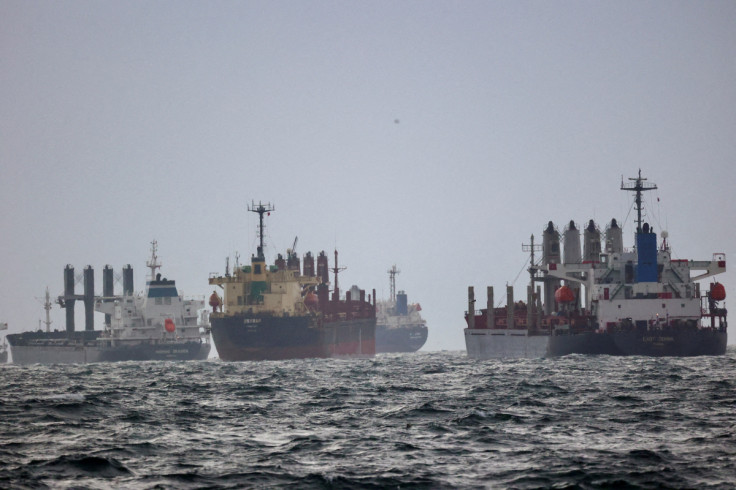Last Ship To Leave Ukraine As Fate Of Black Sea Grain Deal In Russia's Hands

The last ship is due to leave a port in Ukraine on Wednesday under a deal allowing the safe Black Sea export of Ukraine grain, said a U.N. spokesperson, a day before Russia could quit the pact over obstacles to its grain and fertilizer exports.
The United Nations and Turkey brokered the Black Sea deal for an initial 120 days in July last year to help tackle a global food crisis that has been aggravated by Moscow's invasion of Ukraine, one of the world's leading grain exporters.
Moscow agreed to extend the Black Sea pact for a further 120 days in November, but then in March it agreed to a 60 day extension - until May 18 - unless a list of demands regarding its own agricultural exports was met.
To convince Russia in July to allow Black Sea grain exports, the United Nations agreed at the same time to help Moscow with its own agricultural shipments for three years.
"There are still a lot of open questions regarding our part of the deal. Now a decision will have to be taken," Kremlin spokesman Dmitry Peskov told reporters on Tuesday, according to Russian media.
Senior officials from Russia, Ukraine, Turkey and the U.N. met in Istanbul last week to discuss the Black Sea pact. U.N. spokesman Stephane Dujarric said on Tuesday: "Contacts are going on at different levels. We're obviously in a delicate stage."
Turkish Foreign Minister Mevlut Cavusoglu said last week he thought the deal could be extended for at least two more months.
While Russian exports of food and fertilizer are not subject to Western sanctions imposed following the February 2022 invasion of Ukraine, Moscow says restrictions on payments, logistics and insurance have amounted to a barrier to shipments.
The United States has rejected Russia's complaints. U.S. Ambassador to the U.N. Linda Thomas-Greenfield said last week: "It is exporting grain and fertilizer at the same levels, if not higher, than before the full scale invasion."
RISKS
Officials from Russia, Ukraine, Turkey and the U.N. make up a Joint Coordination Centre (JCC) in Istanbul, which implements the Black Sea export deal. They authorize and inspect ships. No new vessels have been authorized by the JCC since May 4.
Authorized ships are inspected by JCC officials near Turkey before travelling to a Ukrainian Black Sea port via a maritime humanitarian corridor to collect their cargo and return to Turkish waters for a final inspection.
Under the deal, there is just one ship still in a Ukrainian port that is due to depart on Wednesday and transit the maritime corridor with its cargo, said a U.N. spokesperson, while another vessel was in transit back to Turkey on Tuesday and another five ships are waiting for an outbound inspection in Turkish waters.
In an excerpt of a letter seen by Reuters last month, Russia told its JCC counterparts that it will not approve any new vessels to take part in the Black Sea deal unless the transits will be done by May 18 - "the expected date of ... closure."
It said this was "to avoid commercial losses and prevent possible safety risks" after May 18.
Given this warning by Russia, it appears unlikely that any ship owners or insurance companies would be willing to continue transporting Ukrainian grain exports if Russia does not agree to an extension of the deal and decides to quit.
The United Nations, Turkey and Ukraine did continue the Black Sea agreement in October during a brief suspension by Russia of its participation.
Some 30 million metric tonnes of grain and foodstuffs has been exported from Ukraine under the Black Sea deal, including nearly 600,000 metric tonnes of grain in World Food Programme vessels for aid operations in Afghanistan, Ethiopia, Kenya, Somalia, and Yemen, the United Nations has said.
© Copyright Thomson Reuters 2025. All rights reserved.





















